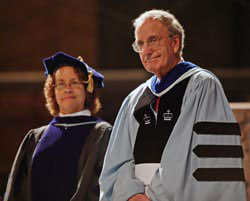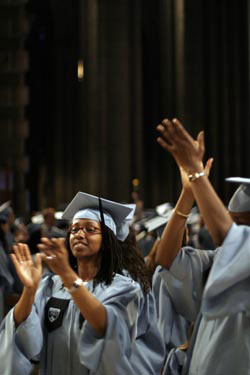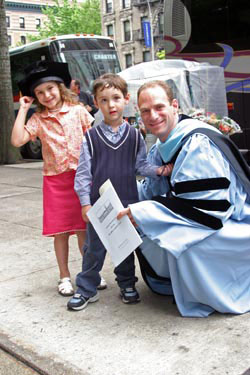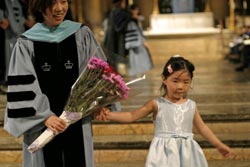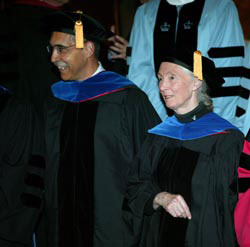The Last Lesson
In his speech to master's graduates, Teachers College President Arthur Levine says that the convocation ceremony is their one final lesson-the lesson of the lives of the medalists. This year, six medalists received the Teachers College Medal for Distinguished Service and one received the Cleveland E. Dodge Medal for Distinguished Service to Education, an award presented to someone working in another field who has made an important impact on education.
Vartan Gregorian, one of the six TC Medalists, was honored for working to make literacy a reality around the world and his role in "righting the wrongs of our education system," through his various roles as President of the New York Public Library, President of Brown University, and his current job as President of the Carnegie Corporation. He told the graduates: a teacher's greatest attribute is to find talent in someone who did not know he or she had that talent.
For his work as one of the great peacemakers, Senator George Mitchell also received the TC Medal. He spoke of the one teacher who changed his life-Elvira Widden. As his English teacher, she inspired a love of reading that "opened a world of knowledge" that he barely knew existed.
Jane Goodall, famed anthropologist whose work with chimpanzees set the standards of primate research, spoke of the importance of conservation, of cross-cultural understanding and the education of young people to be culturally and ecologically aware for the sake of the planet's future. She treated graduates to a message of congratulations a chimpanzee would give them-by giving them an imitation of a chimp call of excitement.
Medalists Jonathan Kozol, Claude Steele, and Lee Bollinger highlighted the 50th anniversary that week of the Brown vs. Board of Education decision that made segregation illegal and the unfortunate fact that schools today are socially and economically as segregated as they had been prior to desegregation efforts.
Kozol called it "social apartheid," citing that the schools he has worked in are made up of 99.8 percent low income students of color.
Steele referred to what is happening today as "tolerated segregation," adding that "truly equal education is impossible if it is not truly integrated education."
Bollinger, who fought a battle to the Supreme Court to maintain the legal right of Affirmative Action in higher education, stressed "how sad it is that education is not a fundamental right and the property tax system of financing schools is constitutional….It is hard for me to understand that we are ready to live in a world where property values determine the kind of education a child receives."
President Arthur Levine also noted in his remarks that 50 years since the Brown decision, we still live in a nation where schools are segregated and relatively few children have health care and health insurance. He told the graduates, "When we admitted you and educated you and now are graduating you, we hope you would be the people who would change those realities."
Dodge Medalist William Ruane, who was honored for the work of his foundation The Carmel Hill Fund, spoke of the work the fund has been able to do to help the low income families on one block in Harlem. From improving housing, to providing services, working with teachers and expanding the school library, the Carmel Hill Fund has helped the children learn to love reading and as a result, improve their standardized test scores dramatically.
This year, a total of 1691 master's students and 188 doctoral students graduated.
A special posthumous master's of philosophy degree was awarded to Jodie Lane, the TC student who, earlier in the year, was tragically killed by electrocution while walking her dogs on the Lower East Side of Manhattan.
Published Tuesday, Jun. 15, 2004
